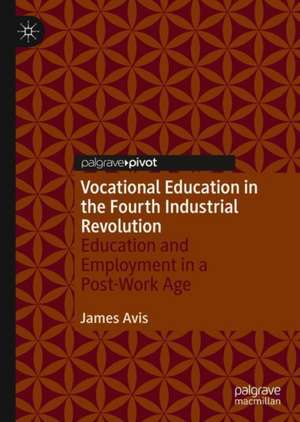Vocational Education in the Fourth Industrial Revolution: Education and Employment in a Post-Work Age
Autor James Avisen Limba Engleză Hardback – 5 ian 2021
| Toate formatele și edițiile | Preț | Express |
|---|---|---|
| Paperback (1) | 468.81 lei 6-8 săpt. | |
| Springer International Publishing – 6 ian 2022 | 468.81 lei 6-8 săpt. | |
| Hardback (1) | 479.46 lei 6-8 săpt. | |
| Springer International Publishing – 5 ian 2021 | 479.46 lei 6-8 săpt. |
Preț: 479.46 lei
Nou
Puncte Express: 719
Preț estimativ în valută:
91.79€ • 95.41$ • 76.10£
91.79€ • 95.41$ • 76.10£
Carte tipărită la comandă
Livrare economică 05-19 februarie 25
Preluare comenzi: 021 569.72.76
Specificații
ISBN-13: 9783030520311
ISBN-10: 3030520315
Pagini: 132
Ilustrații: IX, 132 p. 1 illus.
Dimensiuni: 148 x 210 x 16 mm
Greutate: 0.45 kg
Ediția:1st ed. 2020
Editura: Springer International Publishing
Colecția Palgrave Pivot
Locul publicării:Cham, Switzerland
ISBN-10: 3030520315
Pagini: 132
Ilustrații: IX, 132 p. 1 illus.
Dimensiuni: 148 x 210 x 16 mm
Greutate: 0.45 kg
Ediția:1st ed. 2020
Editura: Springer International Publishing
Colecția Palgrave Pivot
Locul publicării:Cham, Switzerland
Cuprins
Chapter 1. Introduction: Vocational Education in the Fourth Industrial Revolution: Education and Employment in a Post-Work Age.- Chapter 2. Socio-technical Imaginaries and the fourth industrial revolution.- Chapter 3. Robotisation, artificial intelligence, employment and the fourth industrial revolution.- Chapter 4. Post-work, post-capitalism and the fourth industrial revolution.- Chapter 5. Conclusion.
Recenzii
“The book has many strengths. Above all, though a short book, it is incredibly rich, reflecting Avis’s breadth of scholarship about VET and work. … All in all, this is a book to be highly commended and welcomed. James Avis does important work for the field in problematizing some of the current policy nonsense of a critical VET for 4IR. Beyond this, however, he highlights the huge, indeed, existential questions that face VET whatever 4IR amounts to in substance.” (Simon McGrath, Journal of Vocational Education & Training, Vol. 74 (2), 2022)
Notă biografică
James Avis is Professor of Post-Compulsory Education at the University of Derby and Professor Emeritus at the University of Huddersfield. His research interests include vocational education and training, the political economy of post-compulsory education, the labour process and education policy.
Textul de pe ultima copertă
This book examines the concept of the fourth industrial revolution and its potential impact on vocational education and training. Broadly located in a framework rooted in critical/radical theory, the book argues that the affordance of technologies surrounding the fourth industrial revolution are constrained by their location within a neoliberal, if not capitalist, logic. Thus, the impact of this revolution will be experienced differently across European regions as well as low and middle income economies. In order to break this impasse, this book calls for a politics based on non-reformist reforms, premised on an aspiration towards a socially just society that transcends capitalism.
James Avis is Professor of Post-Compulsory Education at the University of Derby, UK, and Professor Emeritus at the University of Huddersfield, UK. His research interests include vocational education and training, the political economy of post-compulsory education, the labour process and education policy.
Caracteristici
Analyses the concept of the fourth industrial revolution and its impact on vocational education and training Imagines the impact of this revolution across European regions and low and middle income economies Call for a politics based on non-reformist reforms
